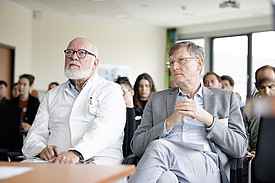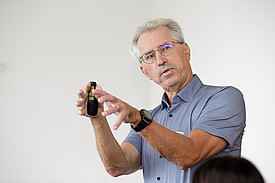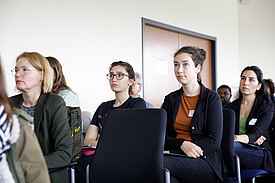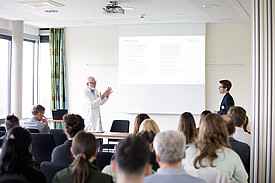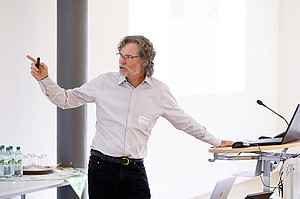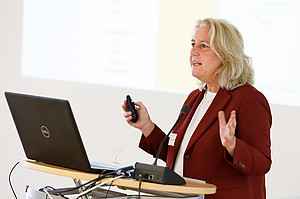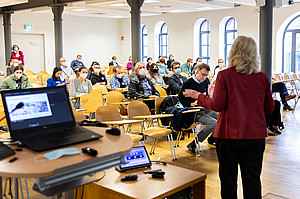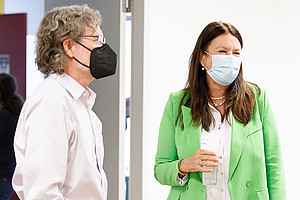Sie befinden sich hier
Inhalt
AI can accelerate the development of cellular immunotherapies

Until now, identifying suitable T cells for cellular immunotherapy has been a laborious and time-consuming process. Scientists from the German Cancer Research Center (DKFZ) and the University Medical Center Mannheim (UMM) want to simplify and speed up the process.
Press release at the Medical Faculty Mannheim (German language)
Nuclear speckles identified as sites of stress-induced gene expression

Researchers at MI3 discovered that several factors required for early steps of splicing are recruited to nuclear speckles under conditions of ribotoxic stress. Nuclear speckle reorganization is accompanied by relocalization of immediate early gene (IEG) transcription foci to nuclear speckles and pronounced splicing activation of the corresponding pre-mRNAs. The study assigns nuclear speckles a new function as sites dedicated to the preferential expression of stress-induced genes.
Press release at the Medical Faculty Mannheim (German language)
MI3-Retreat
On October 9, 2023 the MI3 - Mannheim Institute of Innate Immunoscience - invited to its yearly retreat. This time it took place at "Raum Weitblick” of the “Patientenhaus” on the Medical Faculty and UMM campus in Mannheim. With 80 participants, 10 poster presentations and 17 talks by scientists from MI3's core and associated areas this has been a very well attended, interactive retreat. In addition, Prof. Axel Roers (W3 Professor and Chair of Immunology / Director Institute for Immunology, Heidelberg University) was invited to give insights into his recent research highlights. Taken together, the retreat was very well received by all participants and gave ample opportunities to discuss and get feedback on recent exciting data, to exchange research ideas and to initiate and continue collaborations.
At the retreat the following day, scientists from MI3's core and associated departments presented their exciting MI3 research projects, followed by lively discussions. A common conclusion of both event days is that they were more than worthwhile - not only because many findings of immunological research were exchanged, which always give impulses for project ideas. There was also enough time for networking to deepen existing collaborations and to initiate new ones.
Micronutrient Queosine promotes sex-dependent learning and memory formation

Biochemists at MI3 together with scientists at the DKFZ in Heidelberg and the UMM Department of Neurology discovered a key role for the micronutrient Queosine in learning and memory formation. Mice that cannot incorporate Queosine into tRNA show alterations in the hippocampus, affecting female mice more severely than males. At the molecular level, loss of Queosine-tRNA caused specific defects in mRNA decoding and a general imbalance in protein synthesis.
Press release at the Medical Faculty Mannheim (German language)
A central paradigm in immunorecognition needs updating

Researchers at the Institute for Clinical Chemistry (IKC) have, for the first time, demonstrated the phenotype of a new class of innate immune cells of the monocytic lineage further designated “Variable ImmunoReceptor-Expressing Myeloids” (VIREM). While previous work at the IKC had reported on the molecular evidence of their existence, the group of PD Dr. Tina Fuchs now shows immunofluorescent images of VIREM in the peripheral blood of healthy individuals and gives a first account on their functionalities as derived from experimental models. Genome-wide epigenetic profiling establishes that these cells are unrelated to lymphoid cells with their closest kinship being with monocytes/macrophages. Antibody-expressing VIREM cells (B-VIREM) can load their own Fc receptors with endogenous antibodies, thus linking highly specific cellular antigen recognition functions to potent myeloid effector functions like phagocytosis. VIREM therefore may be perceived as “smart myeloid cells” not requiring a pre-existing B-cell-derived antibody-mediated opsonization to recognize their specific targets. The group´s paper by Neumaier et al. also establishes, for the first time, the specificity of a B-VIREM monoclonal antibody and shows the plasticity and clonalities of B-VIREM responses in a pre-published single-cell dataset of COVID-19 patients in different states of disease. Ongoing research now aims to unravel the role of VIREM in health and disease also using the further characterization of a proprietary conditional KO mouse model.
Hope for a gentler therapy of skin lymphomas

Phase II study shows dimethyl fumarate to be effective and well tolerated.
Press release at the Medical Faculty Mannheim (German language)
MI3-Kick-Off-Symposium and Retreat
On September 29, the MI3 - Mannheim Institute of Innate Immunoscience - invited to a top-class kick-off symposium in the "Alte Brauerei" in Mannheim. On the following day, the MI3 scientists met again for a retreat to discuss their research.
At the start of the kick-off event, Professor Dr. Adelheid Cerwenka, the Managing Director of MI3, introduced the institute, which was founded three years ago in the cross-sectional area of inflammation medicine, immunology and immunotherapies at the Mannheim Medical Faculty of Heidelberg University. MI3 stands for innovative immunological research with a focus on innate immunity. In close connection with the four research foci of the Medical Faculty and clinical foci of the University Hospital Mannheim, MI3 investigates the reactivity and function of innate immune cells in cancer, inflammation and infectious diseases.
With Professor Dr. Christian Bogdan (Friedrich Alexander University, Erlangen), Professor Dr. Alexander Dalpke (Heidelberg University Hospital), Professor Dr. Dr. Ulrike Köhl (Leipzig University Hospital and Fraunhofer Institute for Cell Therapy and Immunology, IZI, Leipzig) and Professor Dr. Nina Papavasiliou (German Cancer Research Center, DKFZ, Heidelberg), leading scientists in the field of innate immunity were recruited for an exciting program of lectures at the symposium. A particular highlight was the keynote lecture by Professor Dr. Lewis Lanier (Department of Microbiology and Immunology, University of California San Francisco; UCSF Helen Diller Family Comprehensive Cancer Center, San Francisco, USA) entitled "Natural killer cell activation".
At the retreat the following day, scientists from MI3's core and associated departments presented their exciting MI3 research projects, followed by lively discussions. A common conclusion of both event days is that they were more than worthwhile - not only because many findings of immunological research were exchanged, which always give impulses for project ideas. There was also enough time for networking to deepen existing collaborations and to initiate new ones.
MI3-Kick-Off-Symposium

MI3-Kick-Off-Symposium
29th September 2022, 01.30 – 06:00 p.m.
MI3-Retreat
30th September 2022, 09:00 a.m. – 05:00 p.m.
Medical Faculty Mannheim, Heidelberg University
Alte Brauerei, Lecture Room 2
Röntgenstrasse 7, 68167 Mannheim
We are pleased to announce that we have put together an exciting program for both our MI3-Retreat as well as for our MI3-Kick-Off Symposium featuring top international/national leaders in the field of innate immunity.
New Option of Treatment for Second-line Therapy of Advanced Oesophageal Cancer

A UMM initiated “RAMONA study” presents worldwide for the first time a combined immune therapy option with two Checkpoint inhibitors as a safe and effective treatment for older patients. Patients with advanced and refractory oesophageal squamous cell carcinoma who do not respond to the first-line radiation therapy and/or chemo therapy face poor prognosis and there has been no standard second-line therapy
The “RAMONA study” led by Professor Dr. Matthias Ebert, head of the Department of Medicine II of the University Medical Center Mannheim (UMM) and Professor of Internal Medicine at Heidelberg University was conducted in over 30 centers in Germany. This trial provides new evidence for a new treatment option with immune therapy in these older patients.
New regulator of gene expression discovered

Biochemists at MI3 and the National Cancer Institute (USA) identified the E3-ligase RNF219 as a novel inhibitor of mRNA deadenylation.
New funding to investigate the dark side of chemotherapy

DFG funds Middle East Cooperation grant to investigate the immunology behind the metastasis-promoting effects of chemotherapy.
Insights into the childhood of an mRNA

A newly developed method to investigate early stages in the life of mRNA offers new insights into a poorly characterized mechanism of gene regulation.
How „paralyzed“ immune cells can be reactivated against brain tumors

Brain tumor cells carrying a specific and frequent mutation were found to reprogram infiltrating immune cells and thereby paralyze the body’s own defense against the tumor. Scientists from Heidelberg, Mannheim and Freiburg discovered a mechanism to reactivate the paralyzed immune system and promote its anti-cancer function.
New Research Training Group in the Field of Immunology

DFG funds Graduate School/GRK2727 "Innate Immune Checkpoints in Cancer and Tissue damage" with 5.3 million euros
Neues Baden-Württembergisches Netzwerk zur Verringerung von Tierversuchen

Mit dem Ziel, die Zahl von Tierversuchen zu reduzieren und den Tierschutz weiter zu verbessern, entsteht in Baden-Württemberg ein neues Netzwerk: Es bündelt neue Ansätze und Maßnahmen an den biomedizinischen Forschungsstandorten des Landes, die nach dem international anerkannten 3R-Prinzip Replacement (Vermeidung), Reduction (Verringerung), Refinement (Verbesserung) die Belastungen für die Versuchstiere begrenzen und die Versuchstierzahl immer weiter senken sollen.
DGfI Stellungnahme zur Impfung gegen SARS-CoV-2 vom 01.03.2021

Zur Impfung gehen – bitte jetzt! Alle zugelassenen Impfstoffe sind sicher und schützen effektiv vor einer schweren COVID-19-Erkrankung. Um die wichtigen Impfziele möglichst schnell zu erreichen, und angesichts der steigenden Frequenz der mutierten SARS-CoV-2 Varianten ist dringend zu raten, alle verfügbaren Impftermine wahrzunehmen, unabhängig vom vorgesehenen Impfstoff!
Cancer cells are masters of disguise

Article by Prof. Dr. Adelheid Cerwenka - Ruperto Carola Forschungsmagazin „Freund & Feind“ – Ausgabe 17, Februar 2021
Myeloid-Derived Suppressor Cells in Action

Blocking Migration of Polymorphonuclear Myeloid-Derived Suppressor Cells Inhibits Mouse Melanoma Progression. Groth C, Arpinati L, Shaul ME, Winkler N, Diester K, Gengenbacher N, Weber R, Arkhypov I, Lasser S, Petrova V, Augustin HG, Altevogt P, Utikal J, Fridlender ZG, Umansky V. Cancers (Basel). 2021 Feb 10;13(4):726. doi: 10.3390/cancers13040726. PMID: 33578808.
Das angeborene Immunsystem scharfschalten und damit die Resistenz gegenüber Krebsimmuntherapien überwinden?

Projekt der Medizinischen Fakultät Mannheim und des DKFZ hat beim Merck Heidelberg Innovation Call überzeugt
Die meisten Formen des Darmkrebses (Kolorektales Karzinom, CRC) sind gegenüber den derzeit überwiegend erforschten Krebsimmuntherapien, die auf die erworbene Immunabwehr setzen, resistent. Kann man die Therapieresistenzen überwinden, indem man zusätzlich die angeborene Immunabwehr ankurbelt?
NK Cells in Cancer Therapy

Single-Cell RNA Sequencing of Tumor-Infiltrating NK Cells Reveals that Inhibition of Transcription Factor HIF-1α Unleashes NK Cell Activity. Ni J, Wang X, Stojanovic A, Zhang Q, Wincher M, Bühler L, Arnold A, Correia MP, Winkler M, Koch PS, Sexl V, Höfer T, Cerwenka A. Immunity. 2020;52:1075.
Kick-Off Retreat

MI3 holds its opening retreat on March 5, 2020. The core and asscoiate members will convene to talk about the first interdisciplinary projects and the next milestones of the new research institute at the Medical Faculty Mannheim of Heidelberg University.


